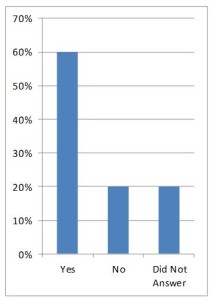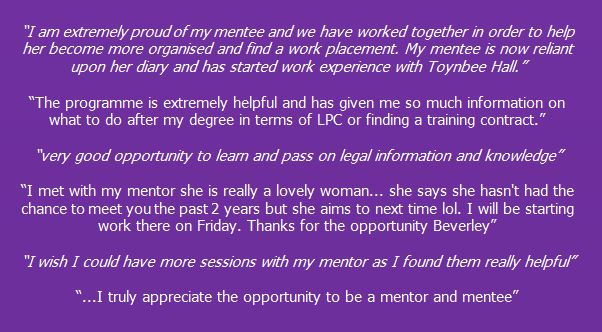5
Beverley Rizzotto
 As an experienced legal professional, but a new entrant into the world of teaching and legal, higher education, I joined London Metropolitan University as the Law Mentoring Programme Coordinator in May 2014 following a successful funding bid by the University to HEFCE to design and deliver a law mentoring programme. The programme’s aims were to engage and assist undergraduate students from under-represented backgrounds into postgraduate study (UG students to be mentored by PG students), and to assist postgraduate students with entry into the legal profession (PG students to be mentored by legal professionals). In terms of widening participation students, the University proudly boasts a student WP population of over 50 percent.
As an experienced legal professional, but a new entrant into the world of teaching and legal, higher education, I joined London Metropolitan University as the Law Mentoring Programme Coordinator in May 2014 following a successful funding bid by the University to HEFCE to design and deliver a law mentoring programme. The programme’s aims were to engage and assist undergraduate students from under-represented backgrounds into postgraduate study (UG students to be mentored by PG students), and to assist postgraduate students with entry into the legal profession (PG students to be mentored by legal professionals). In terms of widening participation students, the University proudly boasts a student WP population of over 50 percent.
The need for a programme and additional support was recognised within the Law School given the difficult task students face in completing their (qualifying) law degrees, progressing to postgraduate study either to complete the academic stage of legal training with a view to entering the legal profession, or to complete further study in order to seek an alternative career in law. As a law graduate, and qualified solicitor who had survived the battle in completing the Legal Practice Course, and successfully obtaining a training contract through sheer grit, determination and hard work, I threw myself into the role fully appreciative of the struggles that I faced nearly a decade ago – struggles which have not eased for current students in a similar situation to that which was once my own. A structured and comprehensive programme was developed, offering students peer-to-peer mentoring support and guidance in respect of what I deem ‘ancillary skills and values’ to those that students gain throughout the course of studying and battling through the academia of their undergraduate and postgraduate qualifications, in areas where support is often offered within educational institutions, but often not sought or found by besieged and stressed students.
Having recently completed a PGCE in post compulsory education, I was keen to instil into the programme learning and teaching methods that I had explored both in theory and in practice as part of my teaching practice experience and study. An emphasis on self-reflection and awareness, critical thinking and peer support and peer-to-peer assessment, I believed was the key to students making well informed career and course choices, which would also equip them with the necessary competence to be able to make successful applications for employment. In developing communication skills and the ability to critically analyse, and learn about one’s self, would then idealistically be transferred into their academic study, where such skills (verbal and written communication and analytical capabilities) are fundamental in learning the law. Participants were thus required as part of the mentoring sessions for example, to practice CV, application form and covering letter drafting, role play in mock job interviews, and discuss future goals and aims, with mentors giving constructive, critical and thought-provoking feedback to mentees.
The programme was student led and student focused from beginning to end, with participants selecting their own mentors/mentees through a “Meet a Mentor” event, akin to a speed dating session, thus taking the otherwise paper-matching exercise out of my hands. Mentors and mentees were given flexibility as to when and where to hold the sessions, and were encouraged to deviate from the structured session plans to meet and fit individual needs.
Success of the programme was gauged by participants reviewing their expectations of the programme set prior to the first mentoring session, and also by completing post programme questionnaires, with some participants attending focus groups to discuss their experiences gained throughout the duration of the ten sessions.
So, did it work? Were the aims of the programme achieved?

Feedback collected from students (above) indicates that the Programme was beneficial to those who participated, and facilitated peer-to-peer learning, which was well received by both mentors and mentees. This suggests that an informal, student-led approach to learning and teaching can be effective. Feedback received also reveals that aims insofar and instilling confidence and professional development is concerned, in undergraduates was achieved to a degree. Undergraduates were encouraged and supported in making applications for voluntary work placements, which would complement their studies, and provide them with much needed work experience for their CV. Without assistance provided by their mentor, such goals may not have been even thought of, yet alone realised. HEFCE has reported that “the most commonly cited intervention … to improve employment outcomes was mentoring.” (Delivering opportunities for students and maximising their success, 2015-2020).
The Programme did not pass without receiving constructive criticism however, further demonstrating that the students, in providing such feedback, had gained transferrable skills in completing the programme in being able to evaluate, but also providing me with a platform upon which to continue my own learning curve.
Figure 1: Do you think the Programme has helped widen your access to PG study?

Changes have been considered, and implemented into the programme this year, based upon the students’ opinions, and I will continue to work together with them in shaping my own teaching journey, and their learning and career path.
Beverley Rizzotto (LLB (Hons), LPC, LLM, PGCE, Solicitor), Law Mentoring Programme Coordinator, London Metropolitan University
